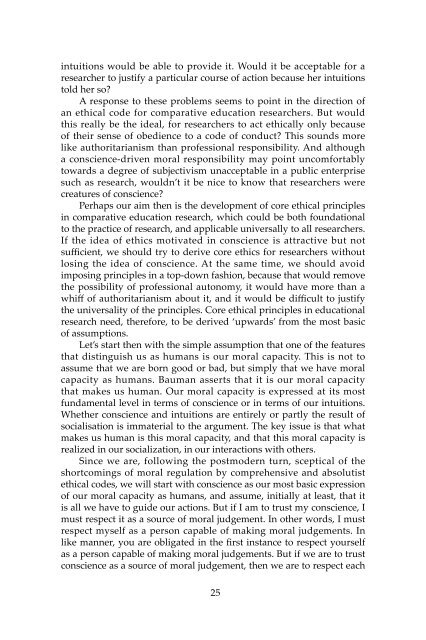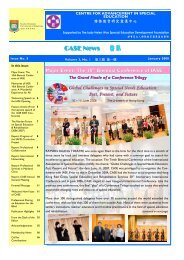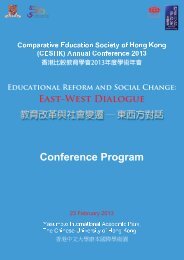Comparative Education Bulletin - Faculty of Education - The ...
Comparative Education Bulletin - Faculty of Education - The ...
Comparative Education Bulletin - Faculty of Education - The ...
You also want an ePaper? Increase the reach of your titles
YUMPU automatically turns print PDFs into web optimized ePapers that Google loves.
intuitions would be able to provide it. Would it be acceptable for a<br />
researcher to justify a particular course <strong>of</strong> action because her intuitions<br />
told her so?<br />
A response to these problems seems to point in the direction <strong>of</strong><br />
an ethical code for comparative education researchers. But would<br />
this really be the ideal, for researchers to act ethically only because<br />
<strong>of</strong> their sense <strong>of</strong> obedience to a code <strong>of</strong> conduct? This sounds more<br />
like authoritarianism than pr<strong>of</strong>essional responsibility. And although<br />
a conscience-driven moral responsibility may point uncomfortably<br />
towards a degree <strong>of</strong> subjectivism unacceptable in a public enterprise<br />
such as research, wouldn’t it be nice to know that researchers were<br />
creatures <strong>of</strong> conscience?<br />
Perhaps our aim then is the development <strong>of</strong> core ethical principles<br />
in comparative education research, which could be both foundational<br />
to the practice <strong>of</strong> research, and applicable universally to all researchers.<br />
If the idea <strong>of</strong> ethics motivated in conscience is attractive but not<br />
sufficient, we should try to derive core ethics for researchers without<br />
losing the idea <strong>of</strong> conscience. At the same time, we should avoid<br />
imposing principles in a top-down fashion, because that would remove<br />
the possibility <strong>of</strong> pr<strong>of</strong>essional autonomy, it would have more than a<br />
whiff <strong>of</strong> authoritarianism about it, and it would be difficult to justify<br />
the universality <strong>of</strong> the principles. Core ethical principles in educational<br />
research need, therefore, to be derived ‘upwards’ from the most basic<br />
<strong>of</strong> assumptions.<br />
Let’s start then with the simple assumption that one <strong>of</strong> the features<br />
that distinguish us as humans is our moral capacity. This is not to<br />
assume that we are born good or bad, but simply that we have moral<br />
capacity as humans. Bauman asserts that it is our moral capacity<br />
that makes us human. Our moral capacity is expressed at its most<br />
fundamental level in terms <strong>of</strong> conscience or in terms <strong>of</strong> our intuitions.<br />
Whether conscience and intuitions are entirely or partly the result <strong>of</strong><br />
socialisation is immaterial to the argument. <strong>The</strong> key issue is that what<br />
makes us human is this moral capacity, and that this moral capacity is<br />
realized in our socialization, in our interactions with others.<br />
Since we are, following the postmodern turn, sceptical <strong>of</strong> the<br />
shortcomings <strong>of</strong> moral regulation by comprehensive and absolutist<br />
ethical codes, we will start with conscience as our most basic expression<br />
<strong>of</strong> our moral capacity as humans, and assume, initially at least, that it<br />
is all we have to guide our actions. But if I am to trust my conscience, I<br />
must respect it as a source <strong>of</strong> moral judgement. In other words, I must<br />
respect myself as a person capable <strong>of</strong> making moral judgements. In<br />
like manner, you are obligated in the first instance to respect yourself<br />
as a person capable <strong>of</strong> making moral judgements. But if we are to trust<br />
conscience as a source <strong>of</strong> moral judgement, then we are to respect each<br />
25
















